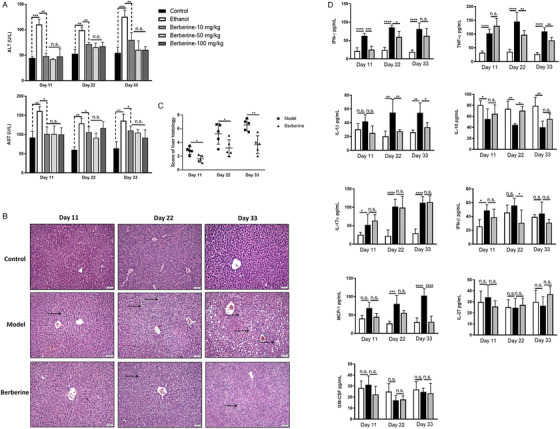FIGURE 1.

Berberine treatment significantly reduced alcoholic liver injury. Mice were divided into five groups, control group (N = 15) receiving control Lieber‐DeCarli diet and vehicle treatment, model group (N = 15) receiving ethanol Lieber‐DeCarli diet and vehicle treatment, low‐dose berberine group (N = 15, 10 mg/kg), medium‐dose berberine group (N = 15, 50 mg/kg), high‐dose berberine group (N = 15, 100 mg/kg) receiving ethanol Lieber‐DeCarli diet. Five mice of each group were sacrificed at day 11, day 22, and day 33, respectively. A, Serum ALT and AST level of mice from groups mentioned above at different time points. Berberine treatment significantly reduced the elevated serum ALT and AST levels at checked time points. No statistical differences among different dose groups of berberine were found. Thus, the dose of 10 mg/kg was used in the following experiments (B). Representative H&E staining images of livers from mice of control group, model group, and berberine group (10 mg/kg). The lipid deposition and steatosis are indicated by arrows. C, Scoring of liver histology. D, Serum contents of inflammatory cytokines including IFN‐γ, TNF‐α, IL‐1β, MCP‐1, IFN‐β, IL‐17A, IL‐10, IL‐27, and GM‐CSF determined by using LEGENDplex™ Mouse Inflammation Panel (13‐plex) with flow cytometer in mice from control group, model group, and berberine group. Berberine reduced the alcohol‐induced increased levels of IFN‐γ, TNF‐α, and IL‐1β. * P < .05, ** P < .01, *** P < .001, **** P < .0001; n.s., not significant
